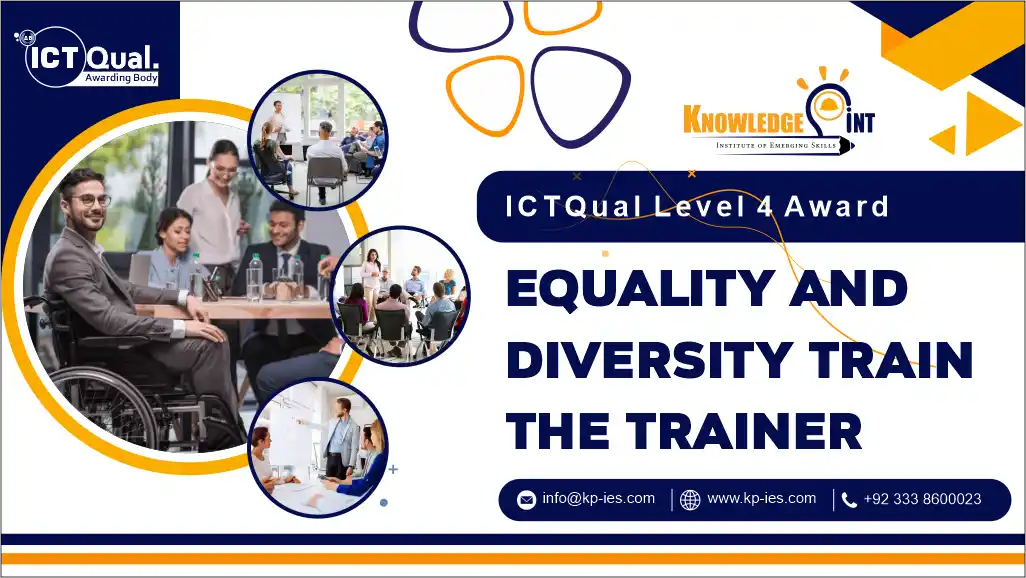In today’s diverse workplaces, fostering an environment of equality and inclusion is not just a moral imperative but also a strategic advantage. The ICTQual Level 4 Award in Equality and Diversity Train the Trainer is designed for professionals who are passionate about promoting equality, diversity, and inclusion (EDI) within their organizations. This certification equips individuals with the knowledge and skills to effectively train others in creating workplaces that embrace diversity and ensure equal opportunities for all.
The ICTQual Level 4 Award in Equality and Diversity Train the Trainer is an advanced certification program that prepares participants to become proficient trainers in EDI practices. Whether you work in human resources, education, government, or any other sector, this award empowers you to design, deliver, and evaluate training programs that promote understanding, respect, and inclusivity.
The ICTQual Level 4 Award in Equality and Diversity Train the Trainer empowers participants to become catalysts for change within their organizations and communities. By promoting understanding, respect, and inclusivity, certified trainers contribute to creating workplaces where diversity is celebrated, and everyone has equal opportunities to thrive. Take the next step in advancing your career and championing diversity by obtaining this valuable certification.
Course Overview
The ICTQual Level 4 Award in Equality and Diversity Train the Trainer consists of 10 mandatory units which are as follows.
The learning outcomes of ICTQual Level 4 Award in Equality and Diversity Train the Trainer include:
1. Introduction to Equality and Diversity Training
- Understand the Role of an EDI Trainer: Gain insight into the responsibilities and impact of trainers in fostering equality, diversity, and inclusion.
- Recognize the Importance of EDI: Understand the benefits of creating inclusive environments and the consequences of discrimination and exclusion.
2. Legislation and Policies
- Comprehend Legal Frameworks: Learn about national and international laws, regulations, and organizational policies related to equality, diversity, and inclusion.
- Stay Updated with Compliance Requirements: Understand the importance of compliance with EDI legislation to promote fair practices and prevent discrimination.
3. Unconscious Bias and Stereotypes
- Identify Unconscious Bias: Recognize unconscious biases and their impact on decision-making and workplace interactions.
- Mitigate Bias: Learn strategies to mitigate unconscious bias and promote unbiased decision-making and behavior.
4. Cultural Competence and Sensitivity
- Develop Cultural Awareness: Gain knowledge of cultural differences and sensitivities to effectively engage with individuals from diverse backgrounds.
- Promote Inclusivity: Learn how to create inclusive environments that respect and value cultural diversity.
5. Addressing Discrimination and Harassment
- Recognize Discriminatory Behaviors: Identify different forms of discrimination and harassment that can occur in the workplace.
- Implement Preventive Measures: Understand strategies and policies to prevent and address discrimination and harassment effectively.
6. Inclusive Leadership and Organizational Culture
- Promote Inclusive Leadership: Learn principles of inclusive leadership and strategies for fostering inclusive organizational cultures.
- Drive Cultural Change: Understand your role in promoting EDI values and practices throughout the organization.
7. Designing and Delivering Equality and Diversity Training
- Design Effective Training Programs: Develop skills to design comprehensive and engaging EDI training programs tailored to organizational needs.
- Deliver Impactful Training Sessions: Master techniques for delivering interactive and impactful training sessions that promote understanding and behavior change.
8. Facilitation Skills and Techniques
- Engage Participants: Learn facilitation skills to create a supportive learning environment and encourage active participation.
- Manage Group Dynamics: Understand how to manage group discussions and address challenging topics sensitively.
9. Assessing Learning Outcomes and Providing Feedback
- Evaluate Training Effectiveness: Learn methods to assess the impact of EDI training on participants’ knowledge, attitudes, and behaviors.
- Provide Constructive Feedback: Develop skills to provide feedback that supports learning and encourages continuous improvement in EDI practices.
10. Continuous Professional Development and Improvement
- Commit to Lifelong Learning: Recognize the importance of continuous professional development in the field of EDI training.
- Stay Updated with Best Practices: Engage in ongoing learning to remain current with emerging trends, research, and innovations in EDI.
Course Benefits of the ICTQual Level 4 Award in Equality and Diversity Train the Trainer:
1. Specialized Expertise
- Auditing Proficiency: Gain specialized knowledge and skills in auditing energy management systems according to the ISO 50001:2018 standard.
- Industry Recognition: Earn a globally recognized qualification that demonstrates your proficiency as an energy management systems auditor.
2. Career Advancement
- Expanded Career Opportunities: Qualify for roles such as Lead Energy Auditor, Energy Management Consultant, or Compliance Officer.
- Higher Earning Potential: Enhance your value to employers and increase your earning potential with specialized expertise in energy management auditing.
3. Industry-Relevant Skills
- Practical Application: Acquire practical skills and techniques for planning, conducting, and documenting energy management system audits.
- Effective Communication: Develop communication skills to interact with auditees, audit teams, and stakeholders effectively.
4. Contribution to Sustainability
- Promotion of Energy Efficiency: Play a key role in promoting energy efficiency and reducing environmental impact within organizations.
- Support for Sustainable Practices: Assist organizations in implementing and maintaining energy management systems that support sustainability goals.
5. Quality Assurance
- Compliance Assurance: Help organizations achieve compliance with ISO 50001:2018 requirements and other relevant regulatory standards.
- Risk Mitigation: Identify areas of non-conformance and provide recommendations for corrective actions to mitigate risks.
6. Continuous Professional Development
- Lifelong Learning: Engage in continuous professional development by staying updated with the latest developments and trends in energy management auditing.
- Networking Opportunities: Connect with industry professionals, auditors, and experts, expanding your professional network and opportunities.
7. Organizational Benefits
- Improved Performance: Contribute to the improvement of organizational energy performance through effective auditing and recommendations for continuous improvement.
- Enhanced Reputation: Help organizations build a positive reputation for their commitment to energy management and sustainability practices.
8. Personal Growth
- Leadership Development: Develop leadership skills to effectively manage audit teams, delegate tasks, and ensure audit objectives are met.
- Confidence Boost: Gain confidence in your abilities as an energy management systems auditor through practical training and hands-on experience.
Upon completing the ICTQual Level 4 Award in Equality and Diversity Train the Trainer, participants have gained essential skills and knowledge to effectively train others in promoting equality, diversity, and inclusion (EDI) within various organizational contexts. This certification opens doors to numerous opportunities for professional growth and advancement in the field of EDI training. Here’s how you can further progress after obtaining this award:
1. Advanced Certifications and Specializations
- Advanced EDI Certifications: Consider pursuing advanced certifications or diplomas in specific aspects of equality, diversity, and inclusion, such as leadership in diversity management, cultural competence training, or unconscious bias training.
- Chartered Institute of Personnel and Development (CIPD) Qualifications: Enhance your HR credentials with certifications from organizations like CIPD, focusing on diversity and inclusion strategies in the workplace.
2. Specialization in Niche Areas
- Sector-Specific Diversity Training: Specialize in providing diversity training tailored to specific industries such as healthcare, education, technology, or finance, addressing unique challenges and opportunities in each sector.
- International Diversity and Inclusion: Gain expertise in global diversity issues and cross-cultural sensitivity, preparing you for roles that involve managing diversity on an international scale.
3. Leadership and Management Roles
- Diversity and Inclusion Manager: Progress into a managerial role where you lead EDI initiatives within organizations, overseeing diversity programs, policies, and training efforts.
- Consultancy and Advisory Roles: Become a diversity consultant or advisor, offering expert guidance to organizations on developing and implementing inclusive practices and policies.
4. Academic and Research Opportunities
- Teaching and Training: Use your expertise to teach diversity and inclusion courses at universities, colleges, or training institutions, contributing to the education and development of future EDI professionals.
- Research and Development: Engage in research projects focusing on EDI topics, such as the impact of diversity on organizational performance, effective strategies for reducing bias, or the role of leadership in fostering inclusive cultures.
5. Professional Networking and Community Involvement
- Join Professional Associations: Become an active member of professional associations and networks focused on diversity and inclusion, such as the Society for Human Resource Management (SHRM) or the Diversity and Inclusion Professionals Network (DIPN).
- Attend Conferences and Workshops: Participate in conferences, workshops, and seminars dedicated to EDI topics to stay updated with industry trends, best practices, and emerging research.
6. Continuous Professional Development
- Stay Updated with Legal and Regulatory Changes: Keep abreast of evolving laws and regulations related to equality, diversity, and inclusion to ensure compliance and best practices.
- Mentorship and Coaching: Provide mentorship to emerging EDI trainers or colleagues, sharing your knowledge and experience to support their professional growth and development.
The ICTQual Level 4 Award in Equality and Diversity Train the Trainer equips participants with the expertise to drive positive change and create inclusive environments within organizations. By pursuing advanced certifications, specializing in specific areas of diversity, assuming leadership roles, engaging in academic research, and actively participating in professional networks, certified trainers can continue to enhance their impact and contribute to fostering diverse and inclusive workplace cultures globally. Continuous learning and development ensure that trainers remain at the forefront of EDI practices, making a meaningful difference in organizational diversity strategies and societal change.







